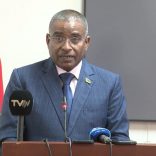Chapo lays the foundations for Mozambique's economic transformation with the support of youth
Mozambique: Creditors’ plan sees $200m paid to 2023, then in line with gas sales

File photo
Holders of Mozambique’s sovereign debt this week proposed to the government that it pay only $200 million (€215 million) up to 2023, and then the remainder in line with revenue from the country’s sales of natural gas.
According to a source close to the negotiations, the proposal that the group of creditors delivered to Mozambique’s finance minister this week provides for the government not to have to pay 80% of the amount foreseen in the initial agreement until 2023.
“The proposal offers substantial financial liquidity relief up to 2023, which corresponds to the period for which this relief was requested,” the source explained to Lusa, adding that Mozambique would thus be exempted from paying almost $1 billion in the next five years – corresponding to 80% of debt service payments between now and the debt’s maturity in 2023.
The creditors’ proposal maintains the requirement of the total repayment of all the public debt issued in 2016 resulting from the conversion of corporate debt securities of the Ematum into sovereign debt securities, but extends the payment period for this and, most importantly, goes some way to meeting the position laid out by Mozambique, which has stated that it lacks the financial capacity to honour its international financial commitments in the short term.
According to the source, who has been monitoring the negotiations, the proposal does not foresee a debt pardon, but rather an extension of the payment period and a “recovery” or clawing back, from 2023, of financial relief available in these next five years.
“Recovery will be carried out by means of a financial instrument linked to tax revenue in the liquefied natural gas sector, and the volume and deadlines of payments shall depend on the amounts actually received in tax revenues,” the source told Lusa.
“The government, in all circumstances, will always keep at least 97% of [gas] revenues, so helping the country’s economic development,” the sources added. The proposal thus “offers a roadmap for Mozambique to normalise relations with the international financial markets and obtain the funding that the country needs in the future to ensure economic and social development objectives.”
The Global Group of Mozambique Bondholders (GGMB), which put forward the plan, was formed in 2016 and is composed of a group of creditors that together accounts for more than 70% of the sovereign debt of $727.5 million issued in 2016 following the conversion of debt securities issued by public tuna fishing company Ematum with state guarantees.
Following the discovery of two loans contracted by public enterprises worth a combined $1.4 billion, off the official books, Mozambique’s financial situation deteriorated, while the international donors cut direct budget support. At the same time raw materials fell, pitching the country into formal default, in practice removed the possibility of regular access to international finance.
Negotiations to restructure the debt have been running since the first official meeting in London in March, with a series of further meetings taking place since then, notably on the fringe of the Spring Meetings of the International Monetary Fund and the World Bank.
Mozambique’s government had already told Lusa at the end of May that if there was no agreement by the end of August or September, there would be no way it could make payments to lenders next year, since no amount would be entered in the 2019 budget, whose drafting deadline expires, according to the Minister of Finance, in September.













Leave a Reply
Be the First to Comment!
You must be logged in to post a comment.
You must be logged in to post a comment.